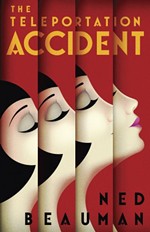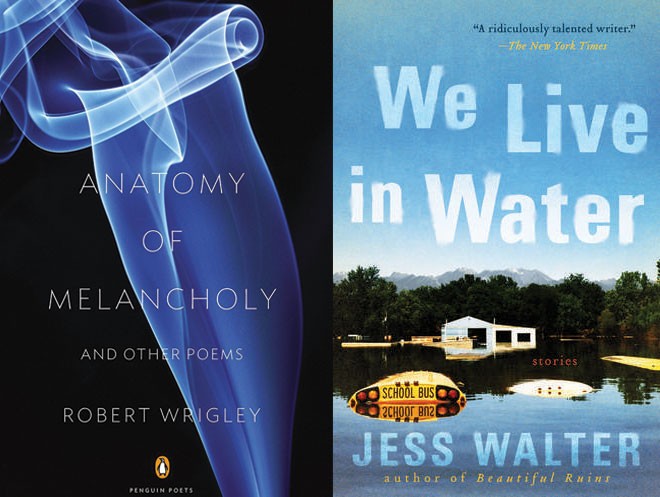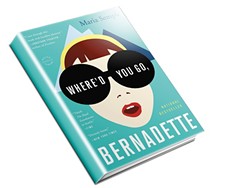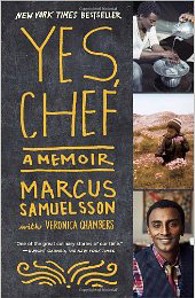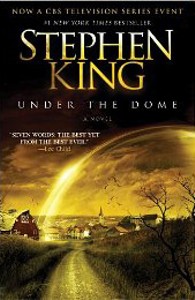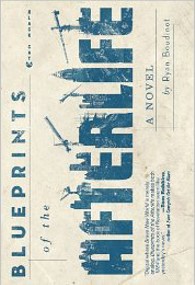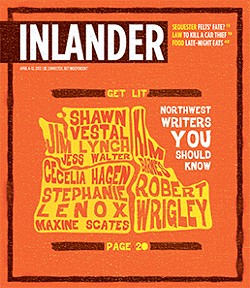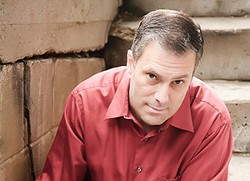Monday, March 3, 2014
First things first. If you don’t know the name Charlie LeDuff, watch this. Now this. OK. That guy is a Pulitzer Prize-winning former New York Times reporter and he’s got a mix of serious chops and flair you won’t find anywhere else. LeDuff’s Work and Other Sins, which I recently finished, is a collection of New York City vignettes, stories of bar patrons and factory workers and 9/11 firefighters. The stories are dense with sensory detail, pulling you into the city and the lives of its characters. Now I’m on to Detroit: An American Autopsy, in which LeDuff returns to his broke and broken hometown. With writing that can at times, like LeDuff’s on-screen presence, feel too sensational, the book explores the big news behind the city’s fall: the politics, the corruption, the pension plans. But it also paints a vivid portrait of the city, its people and the lessons Detroit’s story holds for the rest of us. As LeDuff puts it, “You better look at Detroit because that’s what happens when you run out of money.”
— HEIDI GROOVER
One of my favorite blogs these days is Go Book Yourself because it’s a human curated feed of books to read based on ones I’ve already read and love. It’s not like those generic Amazon recommendations that sometimes totally miss the mark. I’ve gone back to Go Book Yourself time and time again, and I’ve not once been disappointed. Right now, I’m working on Ned Beauman’s The Teleportation Accident, recommended because of my love for The Da Vinci Code and anything Jorge Luis Borges ever wrote. Being myself a little obsessed with the idea of teleportation (if I had a superpower, that would definitely be it), the title jumped out at me and I have not at all been disappointed. I’d never read any of Beauman’s work before, but his writing is sharp and funny and he gives us the beginnings Nazi Germany but from the perspective of a totally clueless, apolitical, unlucky-in-love theater set designer determined to solve a few mysteries of his own. There’s history, there’s romance, there’s noir and it all works together beautifully, the end result being this amazing page-turner that keeps me up at night.
— CLARKE HUMPHREY
First, a confession. I used to be an avid reader, devouring books by the week. But lately whenever I sit down to read in the evenings or before bed, all I do is fall asleep within mere minutes. That said, it takes me ages to get through a novel, so instead I’ve been bookmarking and saving tons of long form pieces to my Instapaper account. The most interesting piece I’ve finished recently is Buzzfeed’s longform piece on the Russian political activist band Pussy Riot. “What Does Pussy Riot Mean Now” gives both a history of how the all-female group’s members came together, and how two of those women ended up being imprisoned by Vladimir Putin for two years after the group’s famous protest performance inside Moscow’s main cathedral. The piece also examines the feelings of Pussy Riot’s members who weren’t jailed, and their fear the group’s overall message has been lost now that two of their bandmates are internationally famous.
— CHEY SCOTT
The military-civilian divide is a topic that interests me enough I’ll click just about every link I see about it — so I know when I encounter a particularly good story or essay, and I recently read an exemplary one: “After War, a Failure of Imagination,” an essay in the New York Times by Iraq veteran and author Phil Klay. In it, he challenges the notion that war is a uniquely terrible experience understandable only to those who were there.
It’s a difficult spot to be in, for both. The civilian wants to respect what the veteran has gone through. The veteran wants to protect memories that are painful and sacred to him from outside judgment. But the result is the same: the veteran in a corner by himself, able to proclaim about war but not discuss it, and the civilian shut out from a conversation about one of the most morally fraught activities our nation engages in — war.
Another of my topics: Women’s participation on the Internet, of which there have also been some great pieces recently. Start with this long piece by Amanda Hess about attempting to document anonymous threats; then this shorter, detailed piece by Amy Wallace about the personal attacks on women who write about controversial topics; then this personal story by Laurie Penny about why short hair brings out the Internet hate.
— LISA WAANANEN
Tags: What We've Been... , Culture , Books , Arts & Culture , Image
Saturday, February 1, 2014
By now, many Northwest readers have enjoyed Jess Walter's Statistical Abstract for My Home of Spokane, Washington, from a few years ago. The essay presents 51 "facts" about the Lilac City based on population demographics, socioeconomic trends and gross domestic grown men on tiny BMXs per capita.
The essay rounded out his 2013 short story collection, We Live in Water, which found its way on to several prominent must-read lists and recently won a Pacific Northwest Bookseller Association award.
In anticipation of receiving the PNBA award, Walter has updated his Statistical Abstract with a new Addendum to Statistical Abstract for my Hometown, Spokane, Washington, which starts at No. 51a and carries on A through Z.
The updated essay takes on a few of the yuppie-hipster cliches behind some of the city's rejuvenated arts and cultural activity in recent years, such as:
p. There are so many cool things going on in Spokane now I can barely keep track of them all. There are so many cool things going on in Spokane now, it's become, frankly, a little irritating. There are so many cool things going on in Spokane now that I have this overwhelming urge to attend a tractor pull.
...
s. Roughly 80 percent of the people in this restaurant are graphic artists, web designers or facial hair models."
Walter writes he put together the new addendum at the request of the PNBA and will read it during his upcoming award ceremony at 7 pm Feb. 13 at Auntie's Bookstore in downtown. His website lists additional events scheduled in Walla Walla and Missoula this month.
Tags: Jess Walter , Spokane , Pacific Northwest Booksellers Association , Culture , Books , Arts & Culture , Image
Monday, January 6, 2014
Two well-known local writers are among the six winners of 2014 Pacific Northwest Booksellers awards, announced today: Jess Walter for We Live in Water, and Robert Wrigley for Anatomy of Melancholy and Other Poems.
Walter's Spokane-centric collection of short stories, published last February, came out to a flurry of positive reviews and has since also appeared on the Oregonian's list of Top 10 Northwest Books of 2013 and Esquire's list of Top 5 short story collections of 2013.
Wrigley, who lives in Moscow, published his latest collection of poems last March to immediate praise, and the PNBA award committee included these comments about their selection:
"Vividly evoking the natural world and that most complex of beasts, the human, who stumbles and dances through it, Robert Wrigley's ninth collection of poetry is a quietly illuminating and richly pleasurable read. He deftly joins story and song in these moving, wry, thought-provoking poems."
Both writers were among those we featured last spring in the Get Lit! issue. (It's alphabetical, so scroll to the bottom.)
The other four winners are: Emily Winfield Martin (Dream Animals: A Bedtime Journey), Joe Sacco (The Great War), Langdon Cook (The Mushroom Hunters) and Ruth Ozeki (A Tale for the Time Being).
You can also see the winners in this little rotating gif for booksellers to use on their websites:

Tags: Jess Walter , Robert Wrigley , Culture , Books , Arts & Culture , Image
Thursday, January 2, 2014
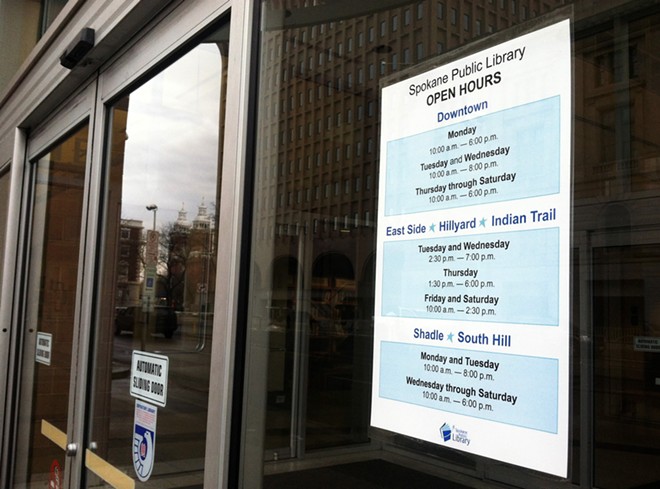
Turnout wasn't very impressive in last February’s special election, but voters who did submit in their ballots overwhelmingly supported a proposed library levy. The most visible effect of that vote started today, as three Spokane Public Library branches increase their weekly hours from 22 to 40. (The cost to property owners equates to about $7 per year for a $100,000 home.)
The new schedule for the East Side, Hillyard and Indian Trail branches is:
Tuesdays: noon to 8 pm
Wednesdays-Saturdays: 10 am to 6 pm
Sundays-Mondays: closed
The hours at the downtown library, as well as the South Hill and Shadle branches, will remain unchanged.
The Spokane Public Library has also started automatically sending a receipt by email when you check out materials. You can opt out, but here’s why you shouldn’t: The email includes an .ics file that can automatically add the due date to whatever online calendar system you use. If one of your New Year’s resolutions is to stop turning in books late, this is going to make it a whole lot easier.
Tags: Spokane Public Library , levy , News , Books , Image
Tuesday, October 15, 2013
Last week writer Maria Semple was in town to speak about her novel, Where’d You Go, Bernadette?, which was selected for this year’s Spokane Is Reading program. If you missed her appearances like we did — we were launching a website, what can you do? — the video is fortunately online.
It was Semple’s first time in Spokane, and she had nice things to say about it — for now.
“Just walking from the hotel I’m almost thinking, hey, maybe I could move here,” she said. “But maybe you wouldn’t want that. I’d have to write a book about it.”
A lot of the most hilarious parts of Bernadette make fun of Seattle (and its “kindergarten moms with gray hair”), and Semple says she initially did readings from the more bland passages for fear of Seattleites’ reactions. Here in Spokane she read one of those very funny portions from the middle of the novel, and the Idaho jokes got plenty of laughs. She also answered audience questions, revealed how she knows so much about Microsoft, explained the term "spelt mom" and criticized another author’s book: “Spoiler alert: nothing happens!”
Here’s part 1, and you can also find parts 2, 3 and 4.
Tags: Culture , Books , Arts & Culture , Image , Video
Tuesday, September 17, 2013
If you’ve still got Favorite Monster on your reading to-do list, it’s time to pick up the pace: Spokane author Sharma Shields is ready to follow that acclaimed 2012 short stories collection with a new novel.
You can read the first chapter of The Handsome Guest on arts and writing site failbetter.com. Here’s an excerpt of the excerpt:
Finally the visitor arrived. Agnes raced to the door and then stood very still, her hands on the belly of her apron, taking a deep breath as though to calm herself. She swept the door open.
There stood her guest, “the most interesting man.”
Eli tried not to stare. He did not see a man at all. What he saw was an enormous, powerful ape crushed into a filthy pinstripe suit. He remembered a book from school about exotic beasts, the giant apes who lived in “the savage countries of the world,” and the guest resembled those creatures: deep hooded brow, small shining eyes, mouth like a long black gash. And the hair! The guest was so hairy that Eli was unsure of the color of his skin: beneath the thick brown fur, his flesh – tough and charred, like strips of dried deer meat – appeared to glow red in some places, purple in others.
Eli gaped. He was horrified and delighted.
Remembering his manners, he stepped to the side and said, politely, “Please, sir, come in.”
You’ll want to read the whole thing here. Shields will be appearing at this weekend’s Bedtime Stories gala for Humanities Washington, along with Jess Walter, Shawn Vestal and Washington Poet Laureate Kathleen Flenniken. Sheilds recently talked about her background in libraries, literary influences and attraction to the dark and the fantastical in an interview with Humanities Washington’s online magazine.
We wrote about Shields and a number of other Northwest writers before the Get Lit! festival last spring. Look for a story about Spokane writers in this week’s upcoming Fall Arts Preview (along with a whole list of literary events).
Tags: Sharma Shields , Get Lit! , Books , Image
Friday, August 9, 2013
In honor of National Book Lovers Day, which is apparently today, Inlander writers share a little about the books they’ve been reading recently:
The my-life-as-an-addict memoir is an overworked genre, with books ranging from just bad to totally made up. But New York Times columnist David Carr gives the style a whole new meaning with The Night of the Gun. Carr revisits his years addicted to cocaine, years that overlapped with newspaper jobs and raising his two daughters, the way a reporter would tell someone else’s story — through taped interviews, mug shots and medical records. He explores the gulf between our memories and the truth, attempting to find out exactly who he was and what he did during those years, even when it’s awful to face. It’s gritty, even nauseating at points, but honest in a way most first-person accounts never are. You’ll wind your way from empathy to anger and back again before you find yourself wondering just how much truth is in the way you see your own life. Find an excerpt here.
— HEIDI GROOVER
Sweeping across generations and cultures, Big Woods by William Faulkner combines several of his best hunting short stories into an interwoven portrait of life in the Southern backcountry. Faulkner’s beloved "The Bear" folds into other related stories exploring manhood, tradition and the steady disappearance of true wilderness. At 198 pages, it makes for a quick read but still captures entire lifetimes, lost rituals and changing societies.
I also continue my decade-long effort to finish Zen and the Art of Motorcycle Maintenance by Robert Pirsig. I recently passed page 300. Don’t tell me, but at the end, I predict the motorcyclist has been a ghost the whole time.
— JACOB JONES
As a writer, celebrity chef Marcus Samuelsson is no Anthony Bourdain. But even without the bad-ass turn of a phrase, Samuelson’s memoir of rising from the humblest of origins to winning the revered James Beard Award, is still entirely compelling. Released last year, Yes, Chef, is at its core a story about food. Samuelsson, who was adopted from Ethiopia at 3 and raised by Swedish parents, begins his tome by explaining where his influential flavors came from — his Swedish grandmother’s cooking, Ethiopian spices and classic French technique. He cooks in kitchens throughout the world before being made head chef at Aquavit, a high-end Swedish-American joint, in New York City at age 24. His story is fascinating; his life is fully lived. And at the end of the book he opens a brand new restaurant in Harlem (he is now an American citizen), called Red Rooster. After reading the book, you’ll want to hop on a plane and go there to taste all of these flavors he’s spoken of converged in one place.
— LAURA JOHNSON
I’m about a quarter into Under The Dome, the same hefty Stephen King book that inspired the TV series airing on CBS right now. I have no patience for those who automatically carp that “the book is better” — but television and books clearly have different strengths.
A great TV show can show nuance of actions — witness the way Walter White’s facial muscles twitch as he weaves his latest lie. But a book can show the depth of thought the way that film never can. This particular premise — a town is trapped under an invisible force field — has its share of people doing apparently really stupid things for seemingly no reason. Maybe they’re just kind of stupid.
But when King writes his books, he spends lengthy passages exploring the motivations behind the actions of his characters. You’ll understand what makes Big Jim Rennie and Dale Barbara tick in a way the TV series fails to explain.
And best of all, King still has a bit of pretentious Great American Novel writer left in him. He’ll occasionally dive into his fair share of poetic prose, wielding omens, allusions, and omniscient narration, reminding readers that he isn’t just a fiction writer, he’s a storyteller.
— DANIEL WALTERS
There’s no obvious reason to sympathize with the troubled nuclear family in Where’d You Go, Bernadette by Maria Semple — they’re brilliant, super-rich and so snobby they consider Seattle provincial. (The reaction in Seattle has been compared to Portland’s reaction to Portlandia.) But the sharp and quick-paced writing brings you into their eccentricities and failures before you have time to object. The email-dossier style and modern urban characters draw easy parallels to Jennifer Egan’s Here Comes the Goon Squad, but the scope is narrower and the satire is funnier. It made sense when I realized Semple is a veteran comedy writer who’s been a writer for Arrested Development, among other shows, because there’s emotional complexity and resonance hiding beneath the absurdity. The novel earned praise when it was first published the end of last summer, but it only now meets my two requirements for a beach/cabin read: It’s out in paperback and widely available at the library.
— LISA WAANANEN
Speaking of books set close to home, Ryan Boudinot’s Blueprints of the Afterlife turns Seattle into a reconstructed New York City in the age of F—-ed Up Shit (FUS). But it’s not your typical post-apocalypse work of science fiction. Boudinot’s characters undergo a different kind of zombification — minds have merged with the Internet to make up the Bionet, a hackable collection of human nervous systems. In Boudinot’s dystopia, DJs hijack another’s consciousness, turning life into automated completion of scripted tasks; a colony of flamboyant clones caters to a psychotic celebrity; pharmers rent their bodies to the government as they grow tissue for harvest, and the same dead body keeps blinking into existence. You laugh and cringe as the patchwork of characters paint a surreal, sometimes unnerving landscape of the future.
—BETH NOTTURNO
Wednesday, August 7, 2013
Alexie: My mullet said to the literary world, “Hello, you privileged prep-school assholes, I’m here to steal your thunder, lightning, and book sales.”
Walter: To my shame now, I grew up embarrassed about being blue-collar, a first-generation college student, a nineteen-year-old father. We usually think of passing in terms of race, but people try to pass as another class, too. I did that.
The occasion is an anniversary, so the point is reminiscing. But the whole thing (it’s not too long) begs for a follow-up about what’s happened since: success, praise, how to attend New Yorker parties and become an esteemed denizen of the literary world without losing where you’re from.
Read the whole conversation (and see the mullet photo) here.
Tags: sherman alexie , jess walter , Books , Image
Thursday, April 11, 2013
This year we focused on some of the excellent Northwest writers participating in the festival, with stories about Jim Lynch, Shawn Vestal, Nance Van Winckel and Jonathan Evison. We also have features on headliner Joyce Carol Oates and poet Major Jackson.
If you’re not sure where to start, here are a few events that caught our eye:
Thursday
Pie & Whiskey Reading
9 pm • free • 21+ • Women’s Club • 1428 W. 9th Ave.
This was a big hit last year — how could it not be? — so it’s back for a second time. With writers Kim Barnes, Dan Butterworth, Jonathan Evison, Kate Lebo, Sam Ligon, Jim Lynch, Laura Read, Marianne Salina, Greg Spatz, Shawn Vestal, Jess Walter and Robert Wrigley.
Friday
Bedtime Stories Reprisal
9:30 am • free • SCC Hagan Foundation Center • 1810 N. Greene St.
Last fall, for the first time in 14 years of Humanities Washington’s Bedtime Stories, the event was held in Spokane. The writers who created original works around a single event prompt — “red eye” — will read and chat once again. With Kim Barnes, Shann Ray, Nance Van Winckel and Jim Lynch.
The Headliner: Joyce Carol Oates
7 pm • $15 • Bing Crosby Theater • 901 W. Sprague Ave.
During her prolific career, Oates has written dozens of books, essays, plays and other works. She was selected for Oprah’s Book Club and chastised by Stephen King for making her new “challenging, problematic, horrifying, funny, prolix” book so difficult to review. But most people thrilled to see her speak don’t need reviews and book clubs to tell them why she’s one of the nation’s most famous living authors.
Saturday
Jess Walter and Shawn Vestal, with Sam Ligon
5 pm • free • Barrister Winery • 1213 West Railroad Ave.
These three guys are excellent Northwest writers, but they’re also friends. Ligon probably already knows all the best topics to raise since he helped shape Walter’s We Live in Water and Vestal’s Godforsaken Idaho, but the conversation will also include the audience, in case you want to ask Walter about his new movie deal.
In Conversation with Major Jackson and Robert Wrigley
7 pm • $15 • Bing Crosby Theater • 901 W. Sprague Ave.
“The meditative practice of both reading and writing poetry began long before I started writing, maybe even long before I started reading,” Jackson says in our feature. Both poets will read from their latest works.
Sunday
Regional MFA Reading and Inland Northwest Faculty Reading 2 pm and 4 pm, respectively • free - Barrister Winery • 1213 West Railroad Ave.
Camp out at Barrister Winery with a bottle for two reading sessions. First, hear from graduate students from around the region. Then hear from the instructors.
Wednesday, March 20, 2013
In 2005, after spending nearly two decades in the U.S. Army without setting foot in a combat zone, David Abrams got sent to Baghdad for 11 months. Last night he spoke at Auntie’s Bookstore about the experience and the satirical novel that came out of it, Fobbit. The title refers to the derogatory nickname for the “stay back, stay safe kind of soldiers” who don’t leave the relative safety of the forward operating base, or FOB.
Like the main character in his novel, Abrams worked in a “cubicle jungle” writing up the awful events of war as patriotic news releases for the American public. “It looks just like an ordinary day at the office,” he said.
He recently wrote an essay for The New York Times reflecting on today’s 10-year anniversary of the beginning of the Iraq war, and also contributed to a new collection of soldiers’ essay, Fire and Forget. Recently, though, he’s been working on a very different next book — his “Hollywood novel” — rescued from the desk drawer and just sent off to the publisher.
His right arm was tucked in a sling Tuesday night, and he started out explaining why: He had been helping his wife hang something up a wall last week when the ladder slipped, and he ended up breaking his humerus bone. “Which sadly means I will not be writing any funny books after this,” he joked.
He credited Percocet for his appearance, read excerpts from his book and answered questions from the audience. Here is an edited version of those questions and answers:
Did you find that writing the piece was therapeutic, or was it challenging to re-enter that persona that you had [while in Iraq]?
I had to read back over my journals that I kept, and that was a really painful thing. If you’ve ever kept a journal when you were a kid, like 15 or 16, and you’ve read back over them and — “Oh my god, did I really say that and think that?” — that’s kind of how it was for me going back over those.
I did have to kind of go back and explore some of where I’d been when I was in Iraq and what I thought, and try to divorce myself from that as much as possible so I could come up with new events and new characters.
Do fobbits often see combat or are they so far removed that they never see the face of war?
Well, I can tell you war is all around you over there. It’s a 360-degree everywhere war. There is no front line, there is no rear line. But you also have to remember that there are different phyla of fobbits: There are those who were like me, who were fobbits because of their job. I just kind of worked myself into a desk job and that’s what I did the entire time that I was over there.
There are those, I’m assuming, who like to be fobbits and really do kind of cower and are afraid to go out beyond the concertina wire, afraid of what will be out there — certain that they’ll find a sniper bullet in their chest the minute they step outside the gates of the FOB.
And then you have your reluctant fobbits, who are usually like staff officers, who are assigned the desk jobs but what they really want to be is [Fobbit character] Colonel Duret out there kicking terrorism’s ass. Yet, there they are, stuck in the desk job, and then they usually try to find ways to get out of their desk duty and go out on ridealongs with other patrols.
But there is a very real danger. When I was over there, we did have several mortars land inside our FOB. I never came close, I wasn’t that close in danger, but there were definitely some soldiers who were killed, like I kind of described — they were sitting there in the courtyard eating their Whoppers, and death-from-the-sky sort of thing, sadly. It can happen anywhere, anytime.
Can you comment on any comparisons to Catch-22 or Slaughterhouse-Five and how those might have, or not, influenced you?
Yes, I’ve read both of those books and I’ve loved them. Interesting story — On January 2nd, 2005, I boarded the plane in Savannah, Georgia, going over to Kuwait, and then from there I went to Baghdad. As I boarded the plane on January 2nd, in one hand I have my M16 rifle and in the other hand I had a copy of Catch-22.
I’d never read Catch-22 before, and I figured, I’m going to war — why not do it now? Maybe it would get my head in the right head space for this war. As it turned out, it did. So it was a very interesting, surreal experience to read Catch-22 as you’re heading into a war that I think Joseph Heller would have really loved, to be honest. He would have had a lot to say about Iraq and Afghanistan and why we’re over there.
Are you surprised by the success of this book?
I really have no basis of comparison, because I’m a debut novelist and this is my first book. I’m just kind of going along with the flow. I wrote this book, I thought maybe somebody would be interested enough to publish it. That was a fairytale moment when Grove Atlantic came back and said, ‘Yeah, we’ll publish it.’” And then I figured, OK, it will get published and there will be some noise in some bookstores for a few months and people will pay attention to it, and then I’ll sink back into semi-obscurity and a quiet life with my wife in Butte, Montana.
But, you know, the book has taken on a life of its own. As writers, we write these books and we set them out there — and it’s a cliché, but once you turn the book loose and it’s published, it’s not your book anymore. ... I’m just happy to see that people have been responding to it the way they have. I’ve been surprised, I actually have.


